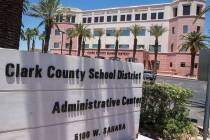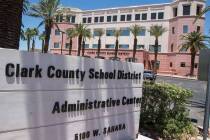UNLV offers boost to remedial students
Kayla Fratianno was never really good in math.
It’s not one of her favorite subjects, and she had “bad math teachers” in middle school and high school.
“I kind of missed some key concepts,” the 18-year-old said Wednesday.
That put the University of Nevada, Las Vegas freshman behind her peers, so she now is taking a remedial math class.
Fratianno is one of hundreds of students who land in remedial courses every year at UNLV, a group that includes sophomores, juniors and seniors who delayed taking required remedial courses and still must pass them.
But UNLV is offering help. Policy changes were implemented this fall to prevent students from putting off remedial courses until late in their college career.
The university is offering a fall Bridge program for freshmen who didn’t meet the requirements for college-level math. There are 84 freshmen enrolled in the program, which began Sept. 9.
The Bridge program provides math support, including online help and live tutors, for the students. At the end of the program students will take a math placement test. If they pass, they can skip the remedial class and enroll in a college-level math class, which will save them money and time.
Fratianno said participating in the program makes her feel more comfortable with math and more confident about passing the placement test. If she does, next semester she’ll be in college-level math.
“I really feel like this is like a booster for next semester,” she said. “An extra boost for me.”
Marvin Williams, 18, who took pre-calculus as a high school senior, took his ACT and “bombed it.” He’s in the Bridge program because he didn’t want to take a remedial class he wouldn’t benefit from. UNLV students don’t receive college credits for remedial courses.
“It’s a great thing, free of charge,” he said. “They are looking out for students and their education.”
UNLV also offered a summer Bridge program for incoming freshmen and enrolled students struggling to pass remedial math. This was the second year the university offered the summer Bridge program, and it was the first year it was open to current students as well, said Ann McDonough, dean of UNLV’s Academic Success Center.
“Students often delay taking math,” she said. “Math is a real barrier for students and prevents them from earning their degrees. We are working to address that.”
Anxiety can also get in the way of students taking their math classes and sometimes the classes they need are not available, she said.
“Students are often afraid of math because they don’t have the study skills,” she said.
A total of 355 incoming freshmen and current students took part in the summer Bridge program, according to UNLV statistics. Of that number, 292, or 82.3 percent, were successful in moving forward to a college-level course.
The program was free as long as the students completed and attended classes, McDonough said.
It costs about $200 per student for the program and the funding comes from the provost’s office. Those who register for the Bridge program and then don’t attend are charged.
Officials are looking for resources to offer the program year-round, she said.
“They (the students) save money and time,” McDonough said. “We are looking forward to continue to grow this program so we can help more students.”
In summer and fall 2012, 30.1 percent of freshmen enrolled in remedial courses at UNLV, according to a Nevada System of Higher Education report, Summer and Fall 2012 Remedial and Developmental Report.
Statewide, 31.6 percent of students who graduated from high school in 2012 enrolled in remedial courses.
But beginning with the incoming freshmen class this fall semester, students won’t be able to delay their remedial courses anymore.
A new Nevada System of Higher Education policy was implemented this fall and calls for degree-seeking students who need remedial courses to complete their remediation before hitting 30 college credits.
Officials didn’t leave course selection entirely up to struggling freshmen. This year, officials selected and enrolled freshmen in the classes they require, said Carl Reiber, vice provost for academic affairs at UNLV.
By the end of their first year, or 30 credits, they will have taken math, English and a first-year seminar class.
“That gets them off on the right foot,” Reiber said.
Students who fail to take the appropriate courses their first year will be placed on probation, Reiber said. But each student will be looked at individually because they are at different levels.
“Each student is unique,” he said.
The policy change doesn’t apply to sophomores, juniors and seniors who chose not to take their remedial courses their first year.
“They were delaying their graduation,” Reiber said. “This is not how it should be. A lot of the students have pushed (math) back to their senior year because they are afraid. It’s not going to go away; you have to do it.”
Students delaying their remedial courses created other issues as well, such as crowding freshmen out of classes they need to take.
“Going forward, that’s not going to happen any more,” Reiber said. “Our intent is to eliminate that.”
Reporter Yesenia Amaro can be reached at 702-383-0440, or yamaro@reviewjournal.com


















